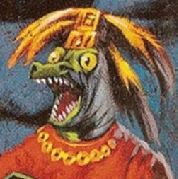|
I've never understood the confusion between Intelligence and Wisdom. Intelligence is deconstructive, rational analysis. You use Int to examine things in detail, consider probabilities, recall facts and figures, and design solutions to problems based on concrete, known quantities. Wisdom is intuitive, holistic understanding. You use Wis to understand a situation at a glance, pick out important details, make rough estimations, and to come up with solutions based on gut instinct. Most "smart" people have both high Int and Wis. They are able to pick up on what's important based on instinct, but are also capable of examining it in detail and understanding the mechanisms behind why it's important. People with high Int, low Wis are capable of examining things in great detail, but tend to get overwhelmed if they have to process too much at once. People with high Wis, low Int are capable of easily understanding things intuitively, but get lost if they have to explain why they know what they know, or figure out why they're wrong when they make a mistake. For example, I'm good at doing math and some types of science, but absolutely horrible at examining principles in detail and why things work the way they do. In general, I'm bad at logic, programming, and other sorts of rigorous thinking, despite the fact that I'm often good at understanding and predicting the end result. When I'm wrong, I can't really examine why, only try to guess again or reframe the problem. I would have moderately high Wis and poor Int. It's not that "this is the way things are." Whatever's going on with me and other people is certainly more complex and nuanced, people manifest this kind of thing in a variety of ways, it's not as if one part of the brain is "Int" and the other "Wis." However, there's still a division between those ways of dealing with and understanding the world, and dividing "smarts" into those two stats serves well enough for representing that. I don't know what any of those things with Wisdom have to do with using a polearm, and "willpower" should be a function of Int, Wis, and Cha, not just Wis. Also don't know why divine casters use Wis. Intuitive connection with the divine? "We need a stat for divine casters"?
|
|
|
|

|
| # ? Apr 25, 2024 07:19 |
|
Scrape posted:My biggest design question right now is how to implement Skills. I hate d20-style static bonuses with a large randomizer. I used to really love L5R's roll&keep system (dice pool, add your Stat plus your Skill, but only keep dice equal to your Stat, try to hit a target number), but nowadays I like simpler mechanics. L5R has too many Stats for me, I think. I don't enough to speak about it, but isn't this sort of thing where GURPS is supposed to excel? Only four Stats and, from what I can tell, the skill system is 3d6 roll-under with all bonuses and penalties applied straight to the skill, and thus to the target number.
|
|
|
|
The GURPS skill system is excellent but I wouldn't call it elegant. Things like defaults can get really confusing.
|
|
|
|
HitTheTargets posted:I don't enough to speak about it, but isn't this sort of thing where GURPS is supposed to excel? Only four Stats and, from what I can tell, the skill system is 3d6 roll-under with all bonuses and penalties applied straight to the skill, and thus to the target number. GURPS runs into the problem where it's usually a good idea to just improve your stats, instead of buying up skills. I sort of like point buy systems, but I don't like the same points going towards both stats and skills, because then you have to balance whether it's more efficient to put them in one or the other. You end up needing to put caps on how many points you can spend in each category.
|
|
|
|
I don't think anyone in this thread is confused by the difference between Int and Wis. I think the discussion is whether it's worth adding a whole Stat to your game in order to differentiate. Like you said, most "smart" people have both. It's more elegant to have one Stat and let a player roleplay a humbling professor type if they want. Also thanks PublicOpinion, Savage Worlds is a system I have never tried but that sounds interesting and more fictionally tied together. I will check that out!
|
|
|
|
Scrape posted:I don't think anyone in this thread is confused by the difference between Int and Wis. I think the discussion is whether it's worth adding a whole Stat to your game in order to differentiate. Like you said, most "smart" people have both. It's more elegant to have one Stat and let a player roleplay a humbling professor type if they want. Oh, sure then. I think there's an inherent value judgment dividing things into Str, Dex, Con, Int, Wis, Cha. You can say that Str and Con should really be linked and the same thing, but the point is more that the overall "bulkiness" of the two is meant to be twice as important as something like Cha or Dex. You can have Str, Dex, Con, or you could have Tough and Fast. In a Str, Dex, Con game, Tough is meant to be more important than Fast, so it gets divided into those two stats. Tough costs more than Fast (since it's actually two stats), but it also has more uses. You could just have it cost twice as much, or you could divide it into Str and Con. In a different game, Tough and Fast might be equal, or Fast might even be more important. Wis and Cha both cover kind of a lot of things, while Str just covers one thing (or, if you feel that Str and Con should be linked, half of one thing), but they're deemed to have the same level of value. Considering how often Cha gets dumped, you could really combine aspects of Wis and Cha into a single stat (Will?), leaving some others to Int.
|
|
|
|
It's way more elegant to have two stats called Intelligence and Wisdom if the difference between being intelligent and being wise is significant in your game. Analyses of real life are almost 100% beside the point.Scrape posted:If you think of toughness as just survival, maybe so. I think of it as "solves problems and achieves goals by expressing toughness." quote:As far as my experience with fiction goes I'm just saying it varies from fiction to fiction, which means you can have your game do whatever you want, except everything. If you try to make it "you know, like in stories," or "you know, like in real life," you will fail. Decide on exactly what you want to have happen in the fiction your game produces, and give the players choices and tools which reflect those aesthetic goals.
|
|
|
|
Doc Hawkins posted:It's way more elegant to have two stats called Intelligence and Wisdom if the difference between being intelligent and being wise is significant in your game. Analyses of real life are almost 100% beside the point. This is a good point. A lot of the discussion about ability scores ends up orbiting DnD, talking about whether or not this stat or that stat is necessary or how to interpret stats through the lense of DnD. That's why ability score discussions almost always fall flat on their face, because DnD's ability scores are really poorly implemented. For a start, in DnD, skill points should be awarded entirely by class and not Int X class mod, and Fort/Will/Rflx should be on a point buy like ability scores instead of being derived stats. A different sort of game can be designed to have no mental stat, or 5 mental stats, as long as they all make sense in play. Worrying about whether or not inteligence is the same thing as wisdom isn't the right thing to concern yourself with. The question is whether, all other things being equal, a wizard with high intelligence should be fundamentally different from a druid with high wisdom. If no (it's certainly no in the case of DnD) get rid of either Int or Wis.
|
|
|
|
In addition, it is important to realize that there is no such thing as a truly universal system, because the rules of the game need to focus their complexity and depth on the parts that matter. Some games aim for realism and predictability, others for getting the feel of an action movie and 'failing forward', others for personal horror where nothing is certain. You can't really encapsulate a system to be like all types of fiction, much less like real life, you are going to have to pick and choose what you want it to do.
|
|
|
|
For me, just thinking about D&D, it seems like the solution should be to make Int and Wis more useful for characters that traditionally don't use them. You should be able to make a tactics roll, and rolling well could give you some control over the features of the battlefield. Everyone should be able to use Cha to do warlordy things and bolster morale. Like, people talk about MAD and DTAS, but it seems like the solution should be to just give everyone MAD. Probably along with decoupling ability scores from combat effectiveness, so you're not choosing between your to-hit and being able to do interesting things.
|
|
|
|
starkebn posted:Brains, Brawn & Balls In the late 90s, I started working on a system with these exact attributes. I hosed almost everything else up though (oh god, percentile everything).
|
|
|
|
Scrape posted:My biggest design question right now is how to implement Skills. I hate d20-style static bonuses with a large randomizer. I used to really love L5R's roll&keep system (dice pool, add your Stat plus your Skill, but only keep dice equal to your Stat, try to hit a target number), but nowadays I like simpler mechanics. L5R has too many Stats for me, I think. It was my first introduction to the idea of skills and ability scores offering different mechanical benefits, as opposed to just being different ways to get the same thing (stacking +1s in D&D/Unisystem, Storyteller's dicepools, most percentile systems etc). The actual implementation is terrible though (Something like 12 ability scores, weird point costs etc). I've since run across other systems that do ability score/skill differentiation differently (WFRP3 skill training gives you a different kind of die with a unique symbol, and... actually I can't remember any others offhand but I know they exist), and I've always liked the idea of Ability Scores and Skills, if in the same system, functioning in fundamentally different manners. Makes them seem actually interesting int heir own right instead of just an extra layer of obfuscation.
|
|
|
|
I've been working on a small tabletop rpg with some friends and recently we've been having a discussion around this one mechanic that we are unsure of. The game uses the old TFT/GURPS style base of STAT+SKILL and Roll under, with your stats providing the basis for your health/movement/etc. and we're generally trying to keep it simple to play all around while still being able to be crunchy and tactical if you bring all the details into play. The problem comes from the INT/MP connection. We wanted to do a dungeon-crawling rpg that avoided the D&D style magic system entirely, so as it is set up now characters get a certain number of Talents/Powers that they can use which include both martial and magical abilities. The magical abilities require spending MP, which we've chosen to think of as "Mental Points" instead of magic points & recently the idea came up to tie your MP score into a sort of CoC Sanity type deal, where if you cast too many spells too fast and drain your MP down to a very low score it snaps your brain (at least temporarily). We're not sure if this would be too penalizing to magic using characters though, and I'd really like to know if there are other games that use a similar system or if anyone has some advice that could help out with this.
|
|
|
|
|
Doc Hawkins posted:It's way more elegant to have two stats called Intelligence and Wisdom if the difference between being intelligent and being wise is significant in your game. Analyses of real life are almost 100% beside the point. This is really the crux of the issue. The issue of mechanical weight is somewhat secondary to this because you can adjust the ease of getting certain attributes if it is truly the problem. What the extra stats give you is the ability to differentiate between more archetypes than was previously possible with one stat, and you have to ask whether these new archetypes are worth the effort necessary to make rules that make them distinguished. And frankly that depends on the setting. Furthermore, the possibility of just making up for it with things like feat and skill equivalents that add to specific uses of the attributes is always there. There are times I have acted exceptional to this, like my April TGD entry where the attributes were negative emotions, but that was in an attempt to be as pretentious as possible, and it was a game where emotions running high was a theme. Sometimes your game is some kind of Sonic the Hedgehog RPG and having 3 separate stats for "Going Fast" is relevant. I have made a game where characters had 4 mental attributes and nothing else. It's really if you want to make a relatively general RPG like a fantasy heartbreaker that you need to think hard about this kind of thing. And that is mainly because you likely haven't thought out what things are important *enough* to differentiate yet.
|
|
|
|
Are there any particular issues that crop up with dicepool/successes systems that I should know about? I know that the Storyteller system uses them and has problems, but they also didn't do the math apparently. The basic mechanic I'm thinking of is this: skill determines the number of dice you roll for an action. Your opponent/target gives a static target number for you to meet/beat. So if you have a skill of six and your opponent has a TN of 4, you roll six dice, and any that come up as a 4 or higher count as a success. Then your talents/traits/etc give you things you can spend successes on, like damage or knockdowns or whatever else, resulting in a kind of build-your-own-D&D4-power system. The idea is that more power results in you being able to do more things with an action, or do the same things but better (by spending multiple successes on one option). It also does a lot to eliminate "dead rounds," since the odds of zero successes are fairly low if you're rolling a decent number of dice.
|
|
|
|
Nolanar posted:...The idea is that more power results in you being able to do more things with an action, or do the same things but better (by spending multiple successes on one option). It also does a lot to eliminate "dead rounds," since the odds of zero successes are fairly low if you're rolling a decent number of dice. This isn't necessary per se but you should really look into L5R. While it does Roll & Keep rather than a success system, it otherwise is rather centred around what you are describing. As for problems, the only problems in Storyteller really inherent to the core mechanics is the fact that you can't really distinguish between highly damaging weapons and highly accurate ones. But that can be fixed if you have some mechanics that provide autosuccesses provided you had at least one from your original pool etc. I'd be wary about using it SPECIFICALLY because it eliminates dead rounds though. The odds are much lower but I've still experienced plenty of dead rounds in nWoD. Furthermore it isn't really a big enough issue to choose your core mechanic over. I do note however that you are suggesting variable TN. The issue with this is that it is *either* mathmathmath or rather reduces the scale for increases to character potency that can happen before the game falls apart entirely.
|
|
|
|
For a skill system that is elegant rather than realistic, look at FATE and in particular how the pyramid influences character development. I'm thinking particularly of Diaspora in this. The FATE skill pyramid basically says that you can't be "top heavy" in your skill selections. The requirement is that you have to have one more skill at a lower level, than at any particular level. So if you want 2 +5 skills you have to have 3 +4s. The character's starting skills can be defined on number of skills, or number of levels of skills. Most FATES will allow you to swap two skills at adjacent levels (swapping a +2 and a +3 preserves the pyramid), add a new skill at +1, or increase one skill by +1. Diaspora is far more restrictive with its pyramid. In Diaspora, each character starts with, and will remain with, 20 skills in a tall pyramid, code:Reaganstorme on RPG.net has a Diaspora hack for Mass Effect, since most people know those characters pretty well taking a look at their skills should give you a good idea of what a character looks like in this system. It's also a really good hack and worth taking a look at here, http://forum.rpg.net/showthread.php?510374-Hacking-Diaspora-Mass-Effect. There's a ton of Aspects suitable for action heroes in there that would be a valuable reference for FATE gamers. Diaspora is one of those games that assumes your character is pretty mature and settled and won't be adding and improving skills willy nilly through experience. Traveller and Shadowrun do this too. A classic D&D game structured around picking up new powers every level won't fit, but it can be done in other FATEs. Choosing which skill system to use requires thinking hard about what kind of character development you want in the game, and that's a good decision to make before the campaign starts. Words about skills end here. Along with an elegant skill system, Diaspora is worth looking at for a number of other reasons. It has a nifty collaborative setting creation system that makes every campaign unique and every player involved in the setting, in the first session of a Diaspora campaign you roll up some star systems before you "roll" your characters . There's a storygamer-friendly (aka rules-light) system for operating a free trader type starship and keeping up the maintenance and mortgage with your trading profits. Combat in FATE is zone-based and full of mechanics for moving on the zone map, manipulating the zones, and interacting with NPCs on the map; Diaspora decided to resolves social conflict on a zone map and gives a bunch of examples for things like solving a murder on a zone map. Fans of combat and conflict will appreciate a good set of platoon-scale combat rules along with a very playable space combat system (the Mass Effect hack has a long list of Geth, Alliance, Battarian slaver, etc. units that you could use to play out a raid on a colony).
|
|
|
|
Speaking as someone who did not even enjoy playing Diaspora, it is absolutely worth reading, playing and stealing from. It's a "big game," which is to say it includes many ideas, and most of them are quite good. E: VVV That is absolutely one of them, yeah. Abstracted zones, ranges and barriers are something that was missing from FATE "non-combat combats." Doc Hawkins fucked around with this message at 17:17 on Aug 26, 2012 |
|
|
|
Doc Hawkins posted:Speaking as someone who did not even enjoy playing Diaspora, it is absolutely worth reading, playing and stealing from. It's a "big game," which is to say it includes many ideas, and most of them are quite good. Their philosophy of "when in doubt how to resolve something make a map and run it like combat" covers a wide array of situations and is a great philosophy. Not everyone is going to love minigames as much as they do, but they're a powerful tool for the GM. I think it's the most elegant current FATE system. On a related note, here's a flowchart style minigame map for mining asteroids in Treveller, 
|
|
|
|
lodoubt posted:This isn't necessary per se but you should really look into L5R. While it does Roll & Keep rather than a success system, it otherwise is rather centred around what you are describing. Those are interesting points. I looked at L5R's system a while back, and it's a really cool way to do it, but my two problems are that it seems to require an attribute/skill split (which I'm trying to avoid, for Reasons), and that anything involving choice (like roll/keep or ORE) is a bit beyond my skills for probability without falling back on Monte Carlo simulations, which I only vaguely remember how to do. That's definitely a point about weapon differentiation. I'm not sure how to handle it there. I was thinking of going with more general weapons like Old School Hack does, with a lot of differentiation built around what your fighting style lets you spend successes on. The funny thing about the pool/successes system and math is that since every die is independent of the others, it actually turns out that you can figure out a probability with a single
|
|
|
|
Bob Quixote posted:The magical abilities require spending MP, which we've chosen to think of as "Mental Points" instead of magic points & recently the idea came up to tie your MP score into a sort of CoC Sanity type deal, where if you cast too many spells too fast and drain your MP down to a very low score it snaps your brain (at least temporarily). We're not sure if this would be too penalizing to magic using characters though, and I'd really like to know if there are other games that use a similar system or if anyone has some advice that could help out with this. So if the average mage has, say, 12 magic points, and dropping below 4 means Bad Things Might Happen, first design around the average Mage having 9 or 10 and just flat out not being able to cast spells when they hit 0. If you see what I mean. Splicer fucked around with this message at 19:03 on Aug 26, 2012 |
|
|
Splicer posted:Treat the Risky bit as an option rather than a requirement, and see if the game is still fun for anyone not taking advantage of it. WFRP3 has a similar thing, where if you roll a chaos star when casting a spell you draw a Bad Thing Happening. However you can only roll chaos stars on purple dice, and you never have to roll a purple die when casting a spell. You can quite easily have a fun time playing a magic user and never have to roll a purple die ever. The incentives for doing the things that mean more purple dice are pretty tempting though... Sounds like a very good idea to me, I'll try that out first and we'll see which works better; if it turns out to not be workable it's no great loss.
|
|
|
|
|
Bob Quixote posted:Sounds like a very good idea to me, I'll try that out first and we'll see which works better; if it turns out to not be workable it's no great loss. Remember that more options = more powerful, so an 8 point mage is less powerful than an 12 point mage with only 8 "safe" points. If you have a perfectly balanced "10 safe points" mage then the equivalently powerful risky mage will be something like "12 points total 9 safe" or whatever. (I'm really just elaborating on part of what I said above but I'm always worried that I've phrased something too vaguely). Secondly, make sure you don't fall into the trap of having the risky option be an all-or-worse-than-nothing. Have the chance of getting consequences be relatively unrelated to whether the actual spell succeeded or not. "Well I tried to fireball all the badguys but instead I developed a fear of rats" is considerably less fun than "Hooray I fireballed all the badguys AND developed a fear of rats". I'd honestly go one step further and set it such that a player can't miss and suffer consequences at the same time, so the only possible results of a risky cast are: Spell fizzles, nothing happens at all. Spell succeeds. Spell succeeds but with consequences. If that makes sense. Splicer fucked around with this message at 01:18 on Aug 27, 2012 |
|
|
|
Apocalypse/Dungeon World has something similar. You roll 10 or higher, you get what you want. Roll 7-9 and you don't get things exactly how you want them to go.
|
|
|
Splicer posted:Two things: I see what you are getting at, and I'm definitely on board with it. I was thinking that MP would only get used up during the successful use of a magical ability/talent, so in that case the only times you'd be at risk of suffering any kind of effects from MP drain would be if you had already successfully performed the act as it was. The way the game is set up is classless (but does have levels) and I'm trying to get a setup going that encourages building rounded characters who have a little of everything rather than ones who go all one way or all another (though thats still an option if the player prefers it).
|
|
|
|
|
Bob Quixote posted:I see what you are getting at, and I'm definitely on board with it. I was thinking that MP would only get used up during the successful use of a magical ability/talent, so in that case the only times you'd be at risk of suffering any kind of effects from MP drain would be if you had already successfully performed the act as it was. An alternate way of presenting it might be to allow casters to cast into "negative points". This might make it easier to remember (I have 10 points, but if I want to live dangerously I can keep casting until I hit -5). So first you'd design spellcasting around having about 12 points (or whatever), but you can't cast points you don't have. Then to finalise the spellcasting you reduce the average to about 10 points but allow casting down to about negative 5, and then see how that went. Bob Quixote posted:The way the game is set up is classless (but does have levels) and I'm trying to get a setup going that encourages building rounded characters who have a little of everything rather than ones who go all one way or all another (though thats still an option if the player prefers it).
|
|
|
|
Splicer posted:How are you doing this so far? I have Advice of Dubious Usefulness but you may be following some or all of it already. Share it anyway! I also have that goal, but I don't actually know what I'm doing.
|
|
|
|
Bob Quixote posted:The magical abilities require spending MP, which we've chosen to think of as "Mental Points" instead of magic points & recently the idea came up to tie your MP score into a sort of CoC Sanity type deal, where if you cast too many spells too fast and drain your MP down to a very low score it snaps your brain (at least temporarily). We're not sure if this would be too penalizing to magic using characters though It depends entirely on the tone of the game and whether or not a wizard character can participate in a fight if they can't use magic because they've run out of mp for the day. A heroic fantasy game where the wizard is expected to use his powers to blast the bad guys probably doesn't do well if the party spell slinger is rocking back and forth in the donkey cart eating his scabs and muttering about the gnomish banking conspiracy. You can still do some sort of magic makes you crazy if you push too hard mechanic, as long as either the effects are fairly minor, mp recharges fairly quickly, or the wizard has some 0 mp powers that still have decent utility. Low fantasy grimdark games, like say WFRP 1/2 played either totally straight or as an ultra black comedy, on the other hand, can utilize high risk spellcasting to great effect. My favorite fantasy rpg is WFRP2, and my favorite memories are of the apprentice wizard stepping up to the plate to prove his worth and everybody else in the party cringng and praying that the caster maintains his sanity and that some sort of demon or explosion or exploding chaos helldemon with cats for hands doesn't tear reality a new one. If MP is easy to consume but slow to replenish, a wizard character would either need several breaks during every adventure (de-facto vancian casting) or good combat utility even though he can't shoot wizard powers. If learning the ability to cast spells consumes a lot of your character building resources, it either needs to be as versatile as being a fighter or being a fighter needs to cost very few character building resources so the wizard can get a minor in throwing punches in bunches. angry_keebler fucked around with this message at 09:25 on Aug 30, 2012 |
|
|
|
A little off the beaten path here, but bear with me for a moment, does anyone remember the Visit the Doctor multiplayer mode in the GCN version of Warioware? For the unfamiliar the Warioware games are essentially minigame collections, the GCN version was intended to be a party game and so it had a bunch of different wacky multiplayer modes. In the Visit the Doctor mode each player took turns playing a minigame, but whether or not they succeeded didn't matter. Before playing the doctor would tell you something along the lines of "play with only your elbows" or "shout your favorite food while playing"; afterward the other players could mash A to applaud. Once a preset number of rounds had been completed whoever had received the most applause won. It was dumb and wacky, but it was a lot of fun and kept everyone involved and paying attention even when it wasn't their turn. This has got me thinking, can you create a system where players reward one another as a means to encourage both embellishing your actions and paying attention to others' turns? How do you encourage players to reward cool things while also minimizing metagaming of the system? Has any other system tried doing something along these lines?
|
|
|
|
Fenn the Fool! posted:This has got me thinking, can you create a system where players reward one another as a means to encourage both embellishing your actions and paying attention to others' turns? How do you encourage players to reward cool things while also minimizing metagaming of the system? Has any other system tried doing something along these lines? Dungeon World does, Aid or Interfere When you help or hinder someone you have a Bond with, roll+Bond with them. On a 10+ they take +1 or -2, your choice. On a 7–9 you also expose yourself to danger, retribution, or cost. I was playing a cleric in DW. They're ok in combat, but I figured it was better to let the fighter have a +1 than to expose myself to do a d6 damage, so I did a bunch of stuff to help the fighter and very little warhammering an opponent who could hit back. Having two Bonds with the fighter is recommended for this approach, bad rolls are just begging the DM to hurt you.
|
|
|
|
There have been a thousand thousand systems which do something like that, but I usually hear the more overtly currency-ish ones being called "fan mail" after the mechanic in Prime Time Adventures. It may not have been the first, but it was close, and worthy of study. But you don't need a complete economy or custom-built system: just give everyone X bonus points/dice every session which they can only spend helping each other. If by "metagaming" you mean "but what if the players realize its always in their interest to give each other bonuses There's also what Capes does, which is impossible to accurately and briefly summarize, but in effect, you get awesome tokens when you do something which makes another player try very hard to stop you and they succeed at it. So if you play a villain for some scenes (you can essentially create and switch between any number of characters) and do something that excites the people playing heroes, and put up a good struggle, but loose in the end, you have perfectly filled the dramatic needs of the game (superhero comic genre), and are payed in these tokens. So there's no need for a designated GM, because the system rewards people who provide interesting opposition, without anyone needing to explicitly say "I like what you did there, here's my daily bonus point." It's crazy-elegant.
|
|
|
|
Scrape posted:My biggest design question right now is how to implement Skills. I hate d20-style static bonuses with a large randomizer. I used to really love L5R's roll&keep system (dice pool, add your Stat plus your Skill, but only keep dice equal to your Stat, try to hit a target number), but nowadays I like simpler mechanics. L5R has too many Stats for me, I think. Paranoia can be as elegant or as complicated as you like, because ultimately skills (there are no ability scores... aside from maybe Power) take a back seat towards having fun - if you're playing Classic or Zap style. In Straight, they become a little more important since the game takes on undertones of humor of the blackest sort, and in that situation it may matter that you have a 12 in Bootlicking. My favorite aspect of Paranoia abilities/skills is the level of player choice given. After generating the overarching skill score (which is the default for all specific skills in that realm), you choose certain ones to be good at (all players are good with their laser pistols, though!), certain ones to be just plain terrible at, and players are given the option for two really specific skills that they get to make up on the spot. You never know when Being Able to Get The Last Crumbs of Algae Chips Out of the Bag will come in handy, but it just might! And who knows: maybe being able to Turn Hot Fun Into Cold Fun might be useful too!
|
|
|
|
Doc Hawkins posted:If by "metagaming" you mean "but what if the players realize its always in their interest to give each other bonuses Actually I was more worried about something along the lines of "Oh man, Fabulous Dan swinging across the chandler and stabbing the Hobgoblin Shogun while reciting an impromptu haiku was  to Jimbob for that generic whirlwind attack he does all the time because...". Always spending your resources is a no brainer; I have no problem with that, you just need to be sure that how fast and how much you can accumulate them doesn't pressure players to use them or lose them. The real issue is making sure the benefits are mechanically flat in all situations so that players don't have that conflict of interest. to Jimbob for that generic whirlwind attack he does all the time because...". Always spending your resources is a no brainer; I have no problem with that, you just need to be sure that how fast and how much you can accumulate them doesn't pressure players to use them or lose them. The real issue is making sure the benefits are mechanically flat in all situations so that players don't have that conflict of interest.
|
|
|
angry_keebler posted:It depends entirely on the tone of the game and whether or not a wizard character can participate in a fight if they can't use magic because they've run out of mp for the day. Well the game is sort of set up encourage characters who take magical abilities to still be able to perform effectively in non-magical combat as well. There are absolutely no classes, you just spread your ability scores (which define how EVERYTHING works in the game so I don't think DTAS applies) and play on. The latest thoughts are that you pick 3 talents/abilities/etc. at character creation and that will define the total of your characters abilities. Magic in this case is more like a mutation or superpower than it is a suite of expanding spells learned in the D&D way. The spells/powers you start the game with are it, so you don't get the D&D problem of casters getting an every expanding list of abilities while non-casters get a few doled out every now and then. At the same time you also don't have to worry about character sheet bloat since you have a few constant abilities instead of new ones being constantly added on. I want to try and make sure the abilities I'm creating all scale up as the character levels up but remain relatively simple since its intended as a beginners/casual game. There are non-magical talents/abilities that give you boosts in combat as well, and you can play a character who has no magical abilities or one who has only magical abilities -- its entirely the players choice.
|
|
|
|
|
Fenn the Fool! posted:Actually I was more worried about something along the lines of "Oh man, Fabulous Dan swinging across the chandler and stabbing the Hobgoblin Shogun while reciting an impromptu haiku was Just displace the utility of the reward from its circumstance: the other players choose when you get Cool Tokens, but you choose when you spend them. E: missing a crucial loving word, goddamn Doc Hawkins fucked around with this message at 07:13 on Sep 1, 2012 |
|
|
|
Bob Quixote posted:Well the game is sort of set up encourage characters who take magical abilities to still be able to perform effectively in non-magical combat as well. There are absolutely no classes, you just spread your ability scores (which define how EVERYTHING works in the game so I don't think DTAS applies) and play on. In classless skill based systems ability scores are an easy way to create a reference point that lets the player know what sort of things their character is good at, so that sounds appropriate. Spending ~1/3 of your character building resources to be a master of something sounds about right, as long as there are lots of different sorts of abilities in which to specialize. The only thng that would worry me is that having 3 abilities doesn't allow for a lot of granularity, so you get a lot of very broad characters but characters with similar powers play almost the same and it can deny some player choice in theme building. Suppose picking wizard speciality, and getting all of the sorts of powers a wizard can use, costs me one out of my three starting points. Well, my guy only wants to cast healing spells or fire spells or ice spells or skeleton spells or w/e. If all of these are available to me as a single power I might as well use them all, even if it doesn't fit in with my character's background/theme, because not using these powers represents losing part of my sunk costs. If fire wizard, skeleton wizard, ice wizard, and healing wizard are each seperate powers that I can purchase at character creation, I might be awfully tempted to buy three of them, eschewing other forms of combat or non combat utility to make my guy the big badass wizard. If subsets of powers are too small, one of my three points only buys me one small subset of spells, I might not invest at all because I'm afraid of carving too small a niche. Stepping up the number of character building points can solve some of these problems. Switching from 3 to 6 or even 9 points, with certain powers or suites of powers costing 2 or 3 points would build more flexibility into charater creation. If I can choose between fire/healing/skeleton/ice for 1 point each, or buying general wizard for 3 points, now I have more room to design a guy. Do I want to be good at all spells, or would I rather pick up only ice spells and mix in some boxing and acrobatics for the same cost? For a fast/casual game it would be a mistake to go way too granular, 30 points to spend with loads of different fiddly powers to choose from, but I thing stepping up from 3 decision points to somewhere between 3 and 9 decision points might not be a bad idea.
|
|
|
angry_keebler posted:In classless skill based systems ability scores are an easy way to create a reference point that lets the player know what sort of things their character is good at, so that sounds appropriate. It's actual even more limited than you imagined since each ability/specialty isn't a subset of spells, but actually just a single ability. If you take Telekinesis as an ability you can move things around but it doesn't give you access to any other types of psychic type powers, you'd have to get them individually. As you gain levels you are able to use your abilities to greater effect (both magical and non-magical abilities generally grow in strength based on character level), but your starting powers are more like super-powers than they are traditional fantasy spells. I wanted to try and do a "less is more" thing with this game, and keep things in the realm of 5 minute character creation rather than letting the crunch build up... I'm always tempted to make things more complex than they should be. I wanted each ability to be simple to use, mechanically unique from the other abilities available and individually useful whether it is a combat or non-combat ability. I also wanted to make a nice big list of powers to pick from and implement a rule that only one character can have one particular Power/Ability at a time to ensure that everyone doesn't just pick the same sets of abilities and that each player would have niche protection for their particular specialty. Since I'm also a sucker for the Rules cyclopedia Weapon Mastery rules I threw in a primitive version of it. Any character can use any weapon in the game, but if you use one of your starting Skills (not the same as the slots for magical/special abilities, totally different thing in the game) to Specialize in a particular weapon you get access to that weapons special ability as well. So even if you do pick all Magical abilities you can still get at least one or two weapon powers to give yourself a boost for when you run out of MP.
|
|
|
|
|
Sorry to double post but I'd been working on an idea for the game I'd mentioned and wanted some advice on it because I'm currently going into unfamiliar territory for me. The game I'm working on is intended to be a combat heavy dungeon-crawly kind of game with the PC's going out and seeking to accomplish goals they set for their characters. Initially I'd been thinking very conventionally, with the idea of starting out relatively weak/inexperienced and getting progressively stronger and encountering greater challenged... but lately I've started to really like the idea that the characters start out at their peak. No levels, no experience points, no gaining new powers or increasing their HP or damage output... none of that. Just put them in with everything as good as its going to get and let them loose on the world. I'm sure there are other games that work on that principle, but I'm unfamiliar with them and would like some ideas about how to make an idea like this run smoothly. I think if I remove the idea of steadily increasing character power from the equation it could lead to several outcomes: the idea of dangerous enemies remaining dangerous instead of having to cycle through foes at different experience levels, players having to invest themselves more in the roleplaying aspect of the game to derive satisfaction since in-worlds goals/accomplishments are the only rewards, a serious decrease in book-keeping since your starting character sheet can stay basically unmodified (except for your inventory or biography/game notes section and what have you) & less need to pause the game and consult the rules since the game is geared toward simplicity.
|
|
|
|
|
Consider "sideways" advancement: every character has the same array of bonuses, but the circumstances they connect to can change. Luke goes from being Gifted Farmboy +3 to Last of the Jedi +3. Most fate games do this, though they werent the first or only. The most free and bare example might be WUSHU. Although, that reminds me of another Evil Hat game, Don't Rest Your Head, which demonstrates "equilibristic" advancement: your character's defining traits are unchangeable, but their "stats" are all resources which shift based on the results of rolls. The assumption is never that these resources will increase indefinitely, but that they change in strategic/dramatic cycles. Capes is also like that: everyone's stats are balanced, but characters might have more or less "debt" which changes their behavior, and players might have more or fewer story tokens, which changes their options.
|
|
|
|

|
| # ? Apr 25, 2024 07:19 |
Doc Hawkins posted:Consider "sideways" advancement: every character has the same array of bonuses, but the circumstances they connect to can change. Luke goes from being Gifted Farmboy +3 to Last of the Jedi +3. Most fate games do this, though they werent the first or only. The most free and bare example might be WUSHU. I can see what you are saying, but I'm not sure how I'd be able to apply it to this particular situation exactly. The game is intended to work like a semi-traditional dungeon-hack type game with crunchy combat and special powers/abilities that are mainly focused on manipulating situations within the story rather than manipulating the narrative itself (if I'm getting myself across alright).
|
|
|
|





























